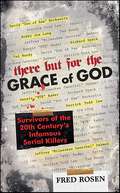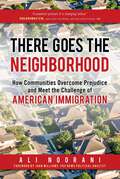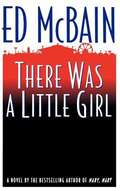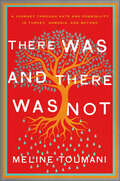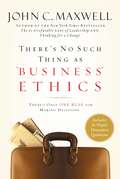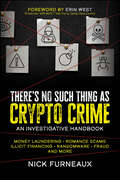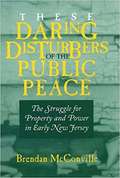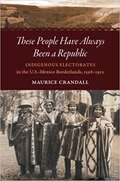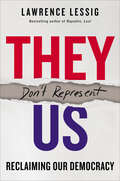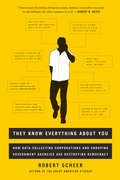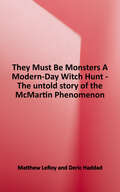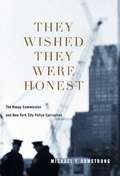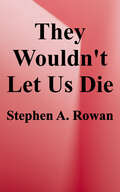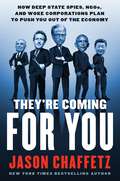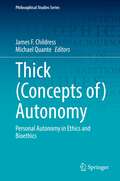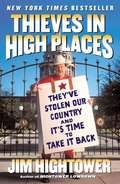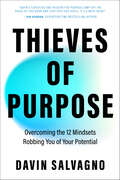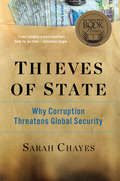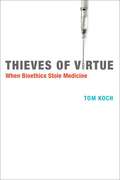- Table View
- List View
Theory of Obligations in International Law (Routledge Research in International Law)
by Cezary MikExamining the fulfilment of international obligations by subjects of this law, this book explores the normative and functional links between the sources and rules of international law on the one hand, and the responsibility for violating international law on the other. In the sphere of law-making, the theory of obligations allows for a more precise and considered formulation of international obligations. It has the potential to enable subjects of international law to behave more rationally, allowing deeper reflection on whether to take on obligations and how to properly perform them. This book proposes a new approach to the issue of the proper operation of international law, with the theory of obligations at its heart. Linking the institutions and concepts of international law into a rational whole, the book offers an analysis of the operation of international law and the behaviour of its subjects to develop a framework for ensuring the ultimate effectiveness of international law. Analysing sources of law including treaties and common law, alongside the resolutions of international organisations, this book demonstrates the practical application of the subject with reference to the jurisprudence of international courts and other bodies. The volume will be of interest to scholars, students, and practitioners concerned with international law – its creation, performance, application, compliance, and enforcement.
Therapeutics, Evidence and Decision-Making
by Michael RawlinsThis book is intended to help decision-makers use, assess and appraise the evidence that underpins decisions about the use of therapeutic interventions. It will inform decision-makers about the nature of evidence, the strengths and weaknesses of the available approaches, and how these can be most effectively distilled for the purpose of reaching re
Therapists, Lawyers, and Divorcing Spouses
by William FisherExperts explore the need for cooperation between the law and helping professions in order to lessen the trauma of the divorce process.
There Are No Dead Here: A Story Of Murder And Denial In Colombia
by Maria McFarland Sánchez-MorenoThe bloody story of the rise of paramilitaries in Colombia, told through three characters--a fearless activist, a dogged journalist, and a relentless investigator--whose lives intersected in the midst of unspeakable terror.Colombia's drug-fueled cycle of terror, corruption, and tragedy did not end with Pablo Escobar's death in 1993. Just when Colombians were ready to move past the murderous legacy of the country's cartels, a new, bloody chapter unfolded. In the late 1990s, right-wing paramilitary groups with close ties to the cocaine business carried out a violent expansion campaign, massacring, raping, and torturing thousands.There Are No Dead Here is the harrowing story of three ordinary Colombians who risked everything to reveal the collusion between the new mafia and much of the country's military and political establishment: Jesús María Valle, a human rights activist who was murdered for exposing a dark secret; Iván Velásquez, a quiet prosecutor who took up Valle's cause and became an unlikely hero; and Ricardo Calderón, a dogged journalist who is still being targeted for his revelations. Their groundbreaking investigations landed a third of the country's Congress in prison and fed new demands for justice and peace that Colombia's leaders could not ignore.Taking readers from the sweltering Medellín streets where criminal investigators were hunted by assassins, through the countryside where paramilitaries wiped out entire towns, and into the corridors of the presidential palace in Bogotá, There Are No Dead Here is an unforgettable portrait of the valiant men and women who dared to stand up to the tide of greed, rage, and bloodlust that threatened to engulf their country.
There But For the Grace of God: Survivors of the 20th Century's Infamous Serial Killers
by Fred RosenThey stared into the faces of pure evil . . . and survived!Ted Bundy . . . Jeffrey Dahmer . . .David "Son of Sam" Berkowitz . . . Dennis Rader, the BTK Killer . . .These are some of the names that strike terror into even the bravest of hearts. Human monsters, they preyed upon the unsuspecting, freely feeding their terrible hungers. Their crimes were unspeakable, as they maimed, tortured, killed, and killed again, leaving so many dead in their bloody wake. But somehow, astonishingly, seven would-be victims fell into the clutches of the century's worst serial killers—and escaped death through courage, divine providence, or just plain luck.This is the remarkable true story of those who lived.
There Goes the Neighborhood: How Communities Overcome Prejudice and Meet the Challenge of American Immigration
by Ali NooraniA leading advocate for immigration reform interviews a wide range of citizens from communities throughout the nation to gauge the level of acceptance of new immigrants.This compelling approach to the immigration debate takes the reader behind the blaring headlines and into communities grappling with the reality of new immigrants and the changing nature of American identity. Ali Noorani, the Executive Director of the National Immigration Forum, interviews nearly fifty local and national leaders from law enforcement, business, immigrant, and faith communities to illustrate the challenges and opportunities they face. From high school principals to church pastors to sheriffs, the author reveals that most people are working to advance society's interests, not exploiting a crisis at the expense of one community. As he shows, some cities and regions have reached a happy conclusion, while others struggle to find balance. Whether describing a pastor preaching to the need to welcome the stranger, a sheriff engaging the Muslim community, or a farmer's wind-whipped face moistened by tears as he tells the story of his farmworkers being deported, the author helps readers to realize that America's immigration debate isn't about policy; it is about the culture and values that make America what it is. The people on the front lines of America's cultural and demographic debate are Southern Baptist pastors in South Carolina, attorneys general in Utah or Indiana, Texas businessmen, and many more. Their combined voices make clear that all of them are working to make America a welcome place for everyone, long-established citizens and new arrivals alike.Especially now, when we feel our identity, culture, and values changing shape, the collective message from all the diverse voices in this inspiring book is one of hope for the future. Now in paperback with a new preface.
There Was a Little Girl (Matthew Hope #11)
by Ed McbainThe first bullet hit Matthew Hope in the shoulder. The second one hit him in the chest. A story about carnivals, midgets, sex, infidelity and crime.
There Was and There Was Not: A Journey Through Hate and Possibility in Turkey, Armenia, and Beyond
by Meline ToumaniNational Book Critics Circle Award Finalist: A young Armenian-American moves to Istanbul to confront questions of history, loyalty, and loving your enemy.Meline Toumani grew up in a close-knit Armenian community in New Jersey where Turkish restaurants were shunned and products made in Turkey were boycotted. The source of this enmity was the Armenian genocide of 1915 at the hands of the Ottoman Turkish government, and Turkey’s refusal to acknowledge it. A century onward, Armenian and Turkish lobbies spend hundreds of millions of dollars to convince governments, courts, and scholars of their clashing versions of history.Frustrated by her community’s all-consuming campaigns for genocide recognition, Toumani leaves a promising job at the New York Times and moves to Istanbul. Instead of demonizing Turks, she sets out to understand them, and in a series of extraordinary encounters over the course of four years, she tries to talk about the Armenian issue, finding her way into conversations that are taboo and sometimes illegal. Along the way, we get a snapshot of Turkish society in the throes of change, and an intimate portrait of a writer coming to terms with the issues that drove her halfway across the world.In this far-reaching quest, Toumani probes universal questions: how to belong to a community without conforming to it, how to acknowledge a tragedy without exploiting it, and most importantly how to remember a genocide without perpetuating the kind of hatred that gave rise to it in the first place.“Although this book offers plenty of insight—funny, affectionate, often frustrated—into a unique diasporic culture, Toumani is ultimately less interested in what makes a person Armenian, Turkish or anything else than in what can happen when we start to think beyond those national identities.” —The Washington Post“A remarkable memoir.” —Kirkus Reviews (starred review)“An unusual book: courageous, intriguing, and at moments, despite its subject, unexpectedly funny. And [Toumani’s] determination to understand and put behind her a century of hatred has echoes for more peoples than just Turks and Armenians.” —Adam Hochschild, author of To End All Wars: A Story of Loyalty and Rebellion, 1914–1918“This deft combination of political and personal narrative is an attempt to cross one of the modern world’s most sensitive divides. With warmth and feeling, it shows why so many people and nations are imprisoned by the past, and what can happen when they set themselves free.” —Stephen Kinzer, author of Crescent and Star: Turkey Between Two Worlds
There's No Such Thing As "Business" Ethics: There's Only One Rule for Making Decisions
by John C. MaxwellBestselling author and expert on leadership John C. Maxwell shares the only rule that matters in business and in life. How does a person judge what is ethical? Sometimes it's clear. In the past year or two, ethical lapses in corporate America have been well documented. But is it always easy to see where the line is in life? What's the standard? And can it work in all situations? John C. Maxwell thinks it can. In THERE'S NO SUCH THING AS BUSINESS ETHICS, Maxwell shows how people can live with integrity by using the Golden Rule as their standard--regardless of religion, culture, or circumstances. Along the way, he delves into the desires of the human heart, reveals the five most common pitfalls that throw people off the ethical track, and teaches how to develop the Midas touch when it comes to personal integrity.
There's No Such Thing as Crypto Crime: An Investigative Handbook
by Nick FurneauxHands-on guidance for professionals investigating crimes that include cryptocurrency In There’s No Such Thing as Crypto Crime: An Investigators Guide, accomplished cybersecurity and forensics consultant Nick Furneaux delivers an expert discussion of the key methods used by cryptocurrency investigators, including investigations on Bitcoin and Ethereum type blockchains. The book explores the criminal opportunities available to malicious actors in the crypto universe, as well as the investigative principles common to this realm. The author explains in detail a variety of essential topics, including how cryptocurrency is used in crime, exploiting wallets, and investigative methodologies for the primary chains, as well as digging into important areas such as tracing through contracts, coin-swaps, layer 2 chains and bridges. He also provides engaging and informative presentations of: Strategies used by investigators around the world to seize the fruits of crypto-related crime How non-fungible tokens, new alt-currency tokens, and decentralized finance factor into cryptocurrency crime The application of common investigative principles—like discovery—to the world of cryptocurrency An essential and effective playbook for combating crypto-related financial crime, There’s No Such Thing as Crypto Crime will earn a place in the libraries of financial investigators, fraud and forensics professionals, and cybercrime specialists.
These Daring Disturbers of the Public Peace: The Struggle for Property and Power in Early New Jersey
by Brendan McConvilleDuring the century preceding the American Revolution, bitter conflicts raged in New Jersey over control of the land tenure system. This book examines how the struggle between yeoman farmers and landed gentry shaped public life in the colony. At once a cultural, political, and social history, it carefully delineates the beliefs of rioters and upholders of order, both of whom wanted control over land. Brendan J. McConville describes how changes in provincial society--affecting politics and government, religious life, economic conditions, gender relations, and ethnic composition--led farmers to resort to violence as a means of settling property disputes. He examines the disagreements in light of competing conceptions of property held by separate landowning classes, differences in the legal and political traditions of British and Dutch colonists, and local conditions unique to New Jersey. He also considers the ways in which the lack of a shared perception of deference among Puritan, Dutch, and multi-ethnic farmers helped foster insurrection. According to McConville, the social transformations brought into sharp focus by the agrarian unrest ultimately undermined imperial control and encouraged the creation of a new American identity. His book--the recipient of the Driscoll Prize from the New Jersey Historical Commission prior to its publication--is an eagerly awaited account of a colony that has seldom been seriously examined by colonial historians and a challenge to those scholars to rethink commonly accepted arguments about the development of the United States.
These People Have Always Been a Republic: Indigenous Electorates in the U. S. -Mexico Borderlands, 1598-1912 (The David J. Weber Series in the New Borderlands History)
by Maurice S. CrandallSpanning three hundred years and the colonial regimes of Spain, Mexico, and the United States, Maurice S. Crandall's sweeping history of Native American political rights in what is now New Mexico, Arizona, and Sonora demonstrates how Indigenous communities implemented, subverted, rejected, and indigenized colonial ideologies of democracy, both to accommodate and to oppose colonial power. <p><p> Focusing on four groups--Pueblos in New Mexico, Hopis in northern Arizona, and Tohono O'odhams and Yaquis in Arizona/Sonora--Crandall reveals the ways Indigenous peoples absorbed and adapted colonially imposed forms of politics to exercise sovereignty based on localized political, economic, and social needs. Using sources that include oral histories and multinational archives, this book allows us to compare Spanish, Mexican, and American conceptions of Indian citizenship, and adds to our understanding of the centuries-long struggle of Indigenous groups to assert their sovereignty in the face of settler colonial rule.
They Came for the Schools: One Town's Fight Over Race and Identity, and the New War for America's Classrooms
by Mike HixenbaughNATIONAL BESTSELLERThe urgent, revelatory story of how a school board win for the conservative right in one Texas suburb inspired a Christian nationalist campaign now threatening to undermine public education in America—from an NBC investigative reporter and co-creator of the Peabody Award–winning and Pulitzer Prize finalist Southlake podcast. Award-winning journalist Mike Hixenbaugh delivers the immersive and eye-opening story of Southlake, Texas, a district that seemed to offer everything parents would want for their children—small classes, dedicated teachers, financial resources, a track record of academic success, and school spirit in abundance. All this, until a series of racist incidents became public, a plan to promote inclusiveness was proposed in response—and a coordinated, well-funded conservative backlash erupted, lighting the fire of a national movement on the verge of changing the face of public schools across the country.They Came for the Schools pulls back the curtain on the powerful forces driving this crusade to ban books, rewrite curricula, limit rights for minority and LGBTQ students—and, most importantly, to win what Hixenbaugh’s deeply informed reporting convinces is the holy grail among those seeking to impose biblical values on American society: school privatization, one school board and one legal battle at a time.They Came for the Schools delivers an essential take on Donald Trump and Ron DeSantis, as they demean public schools and teachers and boost the Christian right’s vision. Hixenbaugh brings to light fascinating connections between this political and cultural moment and past fundamentalist campaigns to censor classroom lessons. Finally, They Came for the Schools traces the rise of a new resistance movement led by a diverse coalition of student activists, fed-up educators, and parents who are beginning to win select battles of their own: a blueprint, they hope, for gaining inclusive and civil schools for all.
They Don't Represent Us: Reclaiming Our Democracy
by Lawrence LessigWITH A NEW FOREWORD ABOUT THE 2020 ELECTION“This urgent book offers not only a clear-eyed explanation of the forces that broke our politics, but a thoughtful and, yes, patriotic vision of how we create a government that’s truly by and for the people.”—DAVID DALEY, bestselling author of Ratf**ked and UnriggedIn the vein of On Tyranny and How Democracies Die, the bestselling author of Republic, Lost argues with insight and urgency that our democracy no longer represents us and shows that reform is both necessary and possible.America’s democracy is in crisis. Along many dimensions, a single flaw—unrepresentativeness—has detached our government from the people. And as a people, our fractured partisanship and ignorance on critical issues drive our leaders to stake out ever more extreme positions. In They Don’t Represent Us, Harvard law professor Lawrence Lessig charts the way in which the fundamental institutions of our democracy, including our media, respond to narrow interests rather than to the needs and wishes of the nation’s citizenry. But the blame does not only lie with “them”—Washington’s politicians and power brokers, Lessig argues. The problem is also “us.” “We the people” are increasingly uninformed about the issues, while ubiquitous political polling exacerbates the problem, reflecting and normalizing our ignorance and feeding it back into the system as representative of our will.What we need, Lessig contends, is a series of reforms, from governmental institutions to the public itself, including:A move immediately to public campaign funding, leading to more representative candidatesA reformed Electoral College, that gives the President a reason to represent America as a wholeA federal standard to end partisan gerrymandering in the states A radically reformed SenateA federal penalty on states that don’t secure to their people an equal freedom to voteInstitutions that empower the people to speak in an informed and deliberative wayA soul-searching and incisive examination of our failing political culture, this nonpartisan call to arms speaks to every citizen, offering a far-reaching platform for reform that could save our democracy and make it work for all of us.
They Know Everything About You: How Data-Collecting Corporations and Snooping Government Agencies Are Destroying Democracy
by Robert Scheer Sara BeladiThey Know Everything About You is a groundbreaking exposé of how government agencies and tech corporations monitor virtually every aspect of our lives, and a fierce defense of privacy and democracy. The revelation that the government has access to a vast trove of personal online data demonstrates that we already live in a surveillance society. But the erosion of privacy rights extends far beyond big government. Intelligence agencies such as the NSA and CIA are using Silicon Valley corporate partners as their data spies. Seemingly progressive tech companies are joining forces with snooping government agencies to create a brave new world of wired tyranny. Life in the digital age poses an unprecedented challenge to our constitutional liberties, which guarantee a wall of privacy between the individual and the government. The basic assumption of democracy requires the ability of the individual to experiment with ideas and associations within a protected zone, as secured by the Constitution. The unobserved moment embodies the most basic of human rights, yet it is being squandered in the name of national security and consumer convenience. Robert Scheer argues that the information revolution, while a source of public enlightenment, contains the seeds of freedom’s destruction in the form of a surveillance state that exceeds the wildest dream of the most ingenious dictator. The technology of surveillance, unless vigorously resisted, represents an existential threat to the liberation of the human spirit.
They Must Be Monsters: A Modern-Day Witch Hunt - The Untold Story of the Mcmartin Phenomenon: The Longest, Most Expensive Criminal Case in U. S. History
by Matthew LeRoy Deric HaddadIt began on August 12, 1983, when a disturbed woman's bizarre accusation ignited hysteria across the small Southern California community of Manhattan Beach. Driven by over-zealous investigators and sensational news media, the legend of The McMartin Preschool became the "case of the century"-the longest, most expensive criminal trial in United States history. <p><p>Four years later, in the spring of 1988, in the midst of the ongoing frenzy, authors Matthew LeRoy and Deric Haddad, students at San Diego State University, left school to follow the case, a path that led them to Manhattan Beach, an upscale community where a vortex of suspicion left most residents leery of outsiders. In this instance, however, where the inquisitors were two unassuming college students, many opened their doors . . . and they had so much to say. <p><p>Through the summer of 1990, the authors conducted over one hundred interviews, as they bonded with key players on both sides of the conflict. No other journalists or network reporters were able to obtain such a diverse range of sources. Now, thirty years later, this extraordinary event comes to life. Written in a creative non-fiction format, They Must Be Monsters is told through the eyes of the "mother who started it all." Using exclusive content - her volume of lost archives-the depth of her paranoia is unveiled; the portrait of a schizophrenic woman whose dark visions became a microcosm of the community around her. These authentic, never-before-seen documents finally bring an end to the mystery behind her fateful accusations. <p><p>The events of Manhattan Beach are true, an untold story, the calamity of an upscale seaside town gripped by fear, where friends turned on neighbors in a frantic campaign of misguided retribution-a devastating crucible that afflicted a generation of innocent people, an event eerily similar to the Salem Witch Trials of 1692. It's a tale of horror, rage, superstition, and faith; a shameful moment in American folklore that's been erroneously ignored by historians - a great injustice that should've never taken place-but, as history tends to repeat itself, most tragically did.
They Wished They Were Honest: The Knapp Commission and New York City Police Corruption
by Michael ArmstrongIn fifty years of prosecuting and defending criminal cases in New York City and elsewhere,Michael F. Armstrong has often dealt with cops. For a single two-year span, as chief counsel to the Knapp Commission, he was charged with investigating them. Based on Armstrong's vivid recollections of this watershed moment in law enforcement accountability—prompted by the New York Times's report on whistleblower cop Frank Serpico—They Wished They Were Honest recreates the dramatic struggles and significance of the Commission and explores the factors that led to its success and the restoration of the NYPD's public image.Serpico's charges against the NYPD encouraged Mayor John Lindsay to appoint prominent attorney Whitman Knapp to chair a Citizen's Commission on police graft. Overcoming a number of organizational, budgetary, and political hurdles, Chief Counsel Armstrong cobbled together an investigative group of a half-dozen lawyers and a dozen agents. Just when funding was about to run out, the "blue wall of silence" collapsed. A flamboyant "Madame," a corrupt lawyer, and a weasely informant led to a "super thief" cop, who was trapped and "turned" by the Commission. This led to sensational and revelatory hearings, which publicly refuted the notion that departmental corruption was limited to only a "few rotten apples."In the course of his narrative, Armstrong illuminates police investigative strategy; governmental and departmental political maneuvering; ethical and philosophical issues in law enforcement; the efficacy (or lack thereof) of the police's anticorruption efforts; the effectiveness of the training of police officers; the psychological and emotional pressures that lead to corruption; and the effects of police criminality on individuals and society. He concludes with the effects, in today's world, of Knapp and succeeding investigations into police corruption and the value of permanent outside monitoring bodies, such as the special prosecutor's office, formed in response to the Commission's recommendation, as well as the current monitoring commission, of which Armstrong is chairman.
They Would Never Hurt a Fly
by Slavenka Drakulic"Who were they? Ordinary people like you or me—or monsters?” asks internationally acclaimed author Slavenka Drakulic as she sets out to understand the people behind the horrific crimes committed during the war that tore apart Yugoslavia in the 1990s. Drawing on firsthand observations of the trials, as well as on other sources, Drakulic portrays some of the individuals accused of murder, rape, torture, ordering executions, and more during one of the most brutal conflicts in Europe in the twentieth century, including former Serbian president Slobodan Miloševic; Radislav Krstic, the first to be sentenced for genocide; Biljana Plavšic, the only woman accused of war crimes; and Ratko Mladic, now in hiding. With clarity and emotion, Drakulic paints a wrenching portrait of a country needlessly torn apart. .
They Wouldn't Let Us Die: The Prisoners of War Tell Their Story
by Stephen A. RowanInterviews with American POWs illuminate their captivity in Vietnamese camps and the emotional and physical horrors that they experienced. <p><p> Immediately after their release from captivity in Vietnam, veteran broadcast journalist Rowan set out to discover how the POWs were able to survive their long years of physical and mental torture. In this classic, he presents twelve gripping interviews with the true heroes of that era: Navy Lieutenant Commander John S. McCain, Marine Corps pilot Ernest Brace, and Air Force Lieutenant Colonel Robert L. Stirm, among them.
They're Coming for You: How Deep State Spies, NGOs, and Woke Corporations Plan to Push You Out of the Economy
by Jason ChaffetzTrump may be in office, but the Democrats have laid the groundwork for permanent power. <p> While the Biden-Harris administration publicly stumbled and flailed, their bureaucrats and allies outside of government have been turning Republican nightmares into dystopian realities. Censoring the truth tellers. Debanking the politically disfavored. Firing the vaccine hesitant. Excluding the white, Christian, and conservative job applicants. Who needs a deep state when academia, big banks, corporations, and the healthcare system are willing to do what the deep state can’t? <p> Now that they’re out of power in the White House and Congress, the Democrats are mobilizing in the shadows, working to make sure an election like 2024 never happens again. In They’re Coming for You, Jason Chaffetz reveals how Democrats have been planting the seeds of political control using unelected institutions that collect and weaponize private information. Most of us know we have traded our privacy for convenience. Most of us have chosen not to worry that the government will track our Facebook posts and arrest us. But what if an online retailer does? What if companies use that data to refuse to hire us, do business with us, or ship products to us? <p> They’re Coming for You lays bare the frightening truth about how these institutions are collecting, buying, selling, and sharing our data without regard for our privacy, civil liberties, or national security. Republican political victories will ring hollow until this bureaucratic partnership with the nonprofit and private sectors is exposed and the power of the administrative state checked. <p> <b>New York Times Bestseller</b>
Thick: Personal Autonomy in Ethics and Bioethics (Philosophical Studies Series #146)
by James F. Childress Michael QuanteThis book explores, in rich and rigorous ways, the possibilities and limitations of “thick” (concepts of) autonomy in light of contemporary debates in philosophy, ethics, and bioethics. Many standard ethical theories and practices, particularly in domains such as biomedical ethics, incorporate minimal, formal, procedural concepts of personal autonomy and autonomous decisions and actions. Over the last three decades, concerns about the problems and limitations of these “thin” concepts have led to the formulation of “thick” concepts that highlight the mental, corporeal, biographical and social conditions of what it means to be a human person and that enrich concepts of autonomy, with direct implications for the ethical requirement to respect autonomy. The chapters in this book offer a wide range of perspectives on both the elements of and the relations (both positive and negative) between “thin” and “thick” concepts of autonomy as well as their relative roles and importance in ethics and bioethics. This book offers valuable and illuminating examinations of autonomy and respect for autonomy, relevant for audiences in philosophy, ethics, and bioethics.
Thieves in High Places: They've Stolen Our Country and Its Time to Take It Back
by Jim HightowerIn Thieves in High Places, Jim Hightower takes on the Kleptocrats, Wobblycrats, and Bushites with hilarious results. Digging up behind-the-scenes dirt on stories the corporate news media overlooks (and don’t get him started on them!), Hightower reveals the real stories behind BushCo’s "Friday Night Massacres," what’s happened to our food, and the Bush plan for empire. With grassroots solutions, drawing on Hightower’s national Rolling Thunder Down- Home Democracy Tour—a traveling festival of rebellion against every tentacle of the corporate-politico power grab—Hightower is tapping into the activist network that is thriving at kitchen tables all over America. This is the real America the rest of the world doesn’t get to see, delivered with Hightower’s own hilarious brand of wit and outrage.
Thieves of Purpose: Overcoming the 12 Mindsets Robbing You of Your Potential
by Davin SalvagnoDive Deep into Finding Your Purpose! Thieves of Purpose by Davin Salvagno is a transformative guide designed to help readers overcome obstacles and unlock their full potential.Laws of Success. Through this vital self help tool, Salvagno explores the 12 "thieves" that sabotage our potential and happiness, offering real-life examples, stories, and thought-provoking questions to help readers identify and overcome their personal obstacles and strengthen their moral principles. Drawing from psychology, business research, and interviews with successful leaders, Salvagno provides a comprehensive understanding of how these thief words impact our lives.Finding your purpose at any stage in life. This self help tool is a guide to navigate life's challenges and decision points in any critical stage in your life. Readers will uncover limiting thoughts, develop practical strategies, and cultivate resilience to achieve a more purpose-driven and fulfilling life. If you're seeking to find your purpose, improve work-life balance, and cultivate success, Thieves of Purpose is your self help tool to personal growth and happiness.Inside this valuable self help book you&’ll: Unlock your potential and achieve greater happiness and fulfillment Become empowered to take control of your life through chapters offering vital insights and actionable steps Find support for your journey of self-improvement If you liked The One Truth, The Greatness Mindset, or The 7 Habits of Highly Effective People, you&’ll love Thieves of Purpose.
Thieves of State: Why Corruption Threatens Global Security
by Sarah ChayesA former adviser to the Joint Chiefs of Staff explains how government's oldest problem is its greatest destabilizing force. The world is blowing up. Every day a new blaze seems to ignite: the bloody implosion of Iraq and Syria; the East-West standoff in Ukraine; abducted schoolgirls in northern Nigeria. Is there some thread tying these frightening international security crises together? In a riveting account that weaves history with fast-moving reportage and insider accounts from the Afghanistan war, Sarah Chayes identifies the unexpected link: corruption. Since the late 1990s, corruption has reached such an extent that some governments resemble glorified criminal gangs, bent solely on their own enrichment. These kleptocrats drive indignant populations to extremes--ranging from revolution to militant puritanical religion. Chayes plunges readers into some of the most venal environments on earth and examines what emerges: Afghans returning to the Taliban, Egyptians overthrowing the Mubarak government (but also redesigning Al-Qaeda), and Nigerians embracing both radical evangelical Christianity and the Islamist terror group Boko Haram. In many such places, rigid moral codes are put forth as an antidote to the collapse of public integrity. The pattern, moreover, pervades history. Through deep archival research, Chayes reveals that canonical political thinkers such as John Locke and Machiavelli, as well as the great medieval Islamic statesman Nizam al-Mulk, all named corruption as a threat to the realm. In a thrilling argument connecting the Protestant Reformation to the Arab Spring, Thieves of State presents a powerful new way to understand global extremism. And it makes a compelling case that we must confront corruption, for it is a cause--not a result--of global instability.
Thieves of Virtue
by Tom KochBioethics emerged in the 1960s from a conviction that physicians and researchers needed the guidance of philosophers in handling the issues raised by technological advances in medicine. It blossomed as a response to the perceived doctor-knows-best paternalism of the traditional medical ethic and today plays a critical role in health policies and treatment decisions. Bioethics claimed to offer a set of generally applicable, universally accepted guidelines that would simplify complex situations. In Thieves of Virtue, Tom Koch argues that bioethics has failed to deliver on its promises. Instead, he argues, bioethics has promoted a view of medicine as a commodity whose delivery is predicated not on care but on economic efficiency. Koch questions the "founding myths" of bioethics by which moral philosophers became practical ethicists who served as adjudicators of medical practice and planning. High philosophy, he argues, does not provide a guide to the practical dilemmas that arise at the bedside of sick patients. Nobody, he writes, carries Kant to a clinical consult. At the heart of bioethics, Koch writes, is a "lifeboat ethic" that assumes "scarcity" of medical resources is a natural condition rather than the result of prior economic, political, and social choices. The idea of natural scarcity requiring ethical triage signaled a shift in ethical emphasis from patient care and the physician's responsibility for it to neoliberal accountancies and the promotion of research as the preeminent good. The solution to the failure of bioethics is not a new set of simplistic principles. Koch points the way to a transformed medical ethics that is humanist, responsible, and defensible.




